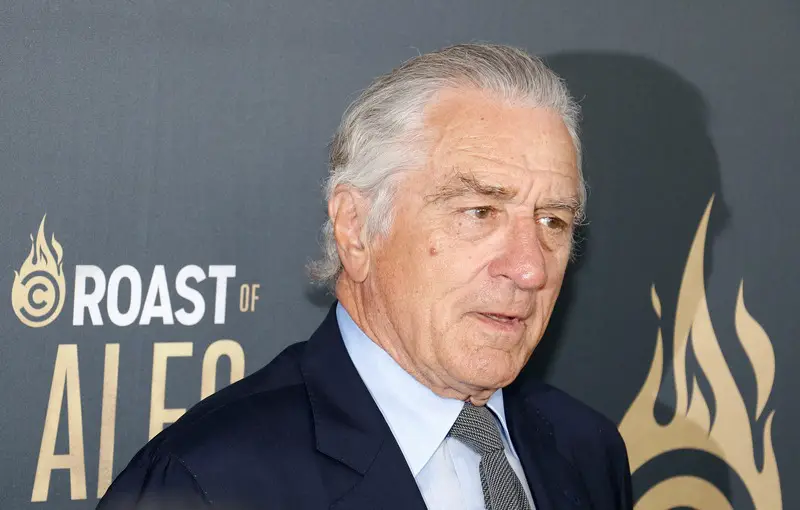Veteran actor Robert De Niro leveraged his acceptance speech for an honorary Palme d’Or at the Cannes Film Festival to issue a critique of President Donald Trump’s policies and advocate for democracy.
The renowned actor transformed what could have been a straightforward award acceptance into a fervent political declaration during the festival’s opening ceremony on Tuesday, May 13th.
“In my country, we are fighting like hell for the democracy we once took for granted. That affects all of us here, because art is the crucible that brings people together, like tonight,” De Niro told the audience inside the Grand Lumiére theater, with his former co-star Leonardo DiCaprio standing nearby following an emotional tribute. Art embraces diversity and that’s why art is a threat, that’s why we are a threat to autocrats and fascists,” he said.
The 81-year-old actor specifically criticized Trump’s impact on arts funding and cultural institutions. He referred to the President’s recent appointment as head of the Kennedy Center, saying, “America’s philistine president has had himself appointed head of one of our premier cultural institutions.” “He has cut funding and support to the arts, humanities and education.” De Niro decried a newly announced 100 percent tariff on foreign-produced films, asserting that “you can’t put a price on creativity, but apparently you can put a tariff on it.”
De Niro framed these policies as part of a broader global threat to artistic freedom, urging collective action. “Like a film, we can’t just all sit back and watch. We have to act, and we have to act now,” he stated while emphasizing that such action should be taken “without violence, but with great passion and determination.”
The actor concluded his remarks with a call to civic engagement: “It’s time for everyone who cares about liberty to organize, to protest, and when there are elections, vote. Vote. Tonight, and for the next 11 days, we show our strength and commitment by celebrating art in this glorious festival. Liberté, Égalité, Fraternité.”
De Niro’s politically charged address followed opening remarks by ceremony host Laurent Lafitte, who set the tone for the evening with his own reflections on the responsibilities of performers. The French actor praised stars who have used their platforms to advocate for important causes, mentioning figures like James Stewart, Josephine Baker, and even Ukrainian President Volodymyr Zelensky, whom he described as “an actor turned war leader.”
Lafitte also alluded to the Trump administration, suggesting that certain issues and words related to them are being “banned by the administration” of what he called “the last superpower of the world.” He emphasized that Cannes provides a sanctuary for “civic cinema” where “we protect real-life cinema.”
The political tone continued with jury president Juliette Binoche, who spoke about artists’ responsibility to bear witness in times of suffering. The acclaimed French actress addressed global challenges, including war, climate disruption, and misogyny, calling them “the demons of our barbarities.” While Binoche had earlier avoided questions about the conflict in Gaza during a press conference, she did acknowledge the October 7 attacks and their aftermath during the ceremony.
The ceremony wasn’t entirely focused on geopolitics. One of the evening’s most heartfelt moments came when Leonardo DiCaprio presented De Niro with his honorary Palme d’Or, receiving a lengthy standing ovation upon taking the stage.
DiCaprio, who has co-starred with De Niro in several films, described his longtime colleague as “the archetype” and “the blueprint” for actors. “He wasn’t just another great actor, he was the actor,” DiCaprio told the audience.
The Oscar winner shared the story of how meeting De Niro changed his life during an audition for “This Boy’s Life” when he was 15 or 16 years old. During the tryout, DiCaprio took a risk by screaming at the top of his lungs at the established star. Later that day, when asked which young actor should get the part, De Niro reportedly responded in characteristic understated fashion: “Second kid from the last.”
“Luckily, that second kid was me. That moment changed my life forever, started my entire career in the world of cinema,” DiCaprio recalled.
In a lighter moment, DiCaprio joked that De Niro had taught generations of actors “how to talk to themselves while staring in a mirror.” He acknowledged De Niro’s well-known discomfort with public attention, saying, “If I’m lucky, I’ll get a nod from him tonight, maybe even a half smile. And I’ll take that as a standing ovation.”
The evening, which was dedicated to Belgian actress Émilie Dequenne who died of cancer at age 43, also featured a surprise appearance by director Quentin Tarantino. The filmmaker delivered the opening proclamation with characteristic enthusiasm, even dropping the microphone on the floor after finishing.
Beyond the speeches and tributes, the ceremony included the world premiere of Amélie Bonnin’s “Leave One Day” (known in France as “Partir Un Jour”), a romantic dramedy starring Juliette Armanet as a Parisian chef reconnecting with her small-town roots and childhood sweetheart during an unexpected trip home.
As is tradition for this prestigious French cultural event, the opening ceremony and film were screened simultaneously in 382 movie theaters throughout France, allowing thousands to participate in the celebration of cinema that will continue over the festival’s 11-day run.











